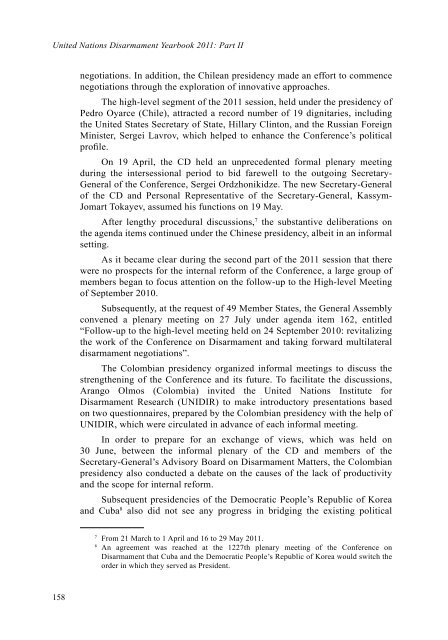DYB2011-Part-II-web
DYB2011-Part-II-web
DYB2011-Part-II-web
Create successful ePaper yourself
Turn your PDF publications into a flip-book with our unique Google optimized e-Paper software.
United Nations Disarmament Yearbook 2011: <strong>Part</strong> <strong>II</strong><br />
158<br />
negotiations. In addition, the Chilean presidency made an effort to commence<br />
negotiations through the exploration of innovative approaches.<br />
The high-level segment of the 2011 session, held under the presidency of<br />
Pedro Oyarce (Chile), attracted a record number of 19 dignitaries, including<br />
the United States Secretary of State, Hillary Clinton, and the Russian Foreign<br />
Minister, Sergei Lavrov, which helped to enhance the Conference’s political<br />
profile.<br />
On 19 April, the CD held an unprecedented formal plenary meeting<br />
during the intersessional period to bid farewell to the outgoing Secretary-<br />
General of the Conference, Sergei Ordzhonikidze. The new Secretary-General<br />
of the CD and Personal Representative of the Secretary-General, Kassym-<br />
Jomart Tokayev, assumed his functions on 19 May.<br />
After lengthy procedural discussions, 7 the substantive deliberations on<br />
the agenda items continued under the Chinese presidency, albeit in an informal<br />
setting.<br />
As it became clear during the second part of the 2011 session that there<br />
were no prospects for the internal reform of the Conference, a large group of<br />
members began to focus attention on the follow-up to the High-level Meeting<br />
of September 2010.<br />
Subsequently, at the request of 49 Member States, the General Assembly<br />
convened a plenary meeting on 27 July under agenda item 162, entitled<br />
“Follow-up to the high-level meeting held on 24 September 2010: revitalizing<br />
the work of the Conference on Disarmament and taking forward multilateral<br />
disarmament negotiations”.<br />
The Colombian presidency organized informal meetings to discuss the<br />
strengthening of the Conference and its future. To facilitate the discussions,<br />
Arango Olmos (Colombia) invited the United Nations Institute for<br />
Disarmament Research (UNIDIR) to make introductory presentations based<br />
on two questionnaires, prepared by the Colombian presidency with the help of<br />
UNIDIR, which were circulated in advance of each informal meeting.<br />
In order to prepare for an exchange of views, which was held on<br />
30 June, between the informal plenary of the CD and members of the<br />
Secretary-General’s Advisory Board on Disarmament Matters, the Colombian<br />
presidency also conducted a debate on the causes of the lack of productivity<br />
and the scope for internal reform.<br />
Subsequent presidencies of the Democratic People’s Republic of Korea<br />
and Cuba8 also did not see any progress in bridging the existing political<br />
7 From 21 March to 1 April and 16 to 29 May 2011.<br />
8 An agreement was reached at the 1227th plenary meeting of the Conference on<br />
Disarmament that Cuba and the Democratic People’s Republic of Korea would switch the<br />
order in which they served as President.


